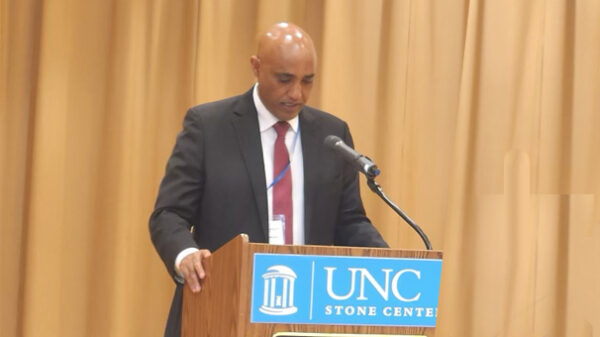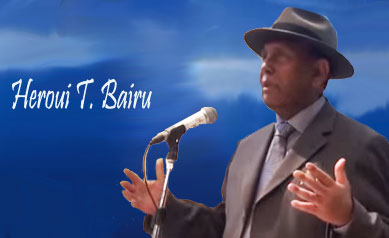Perspective On Fessehaye Woldu’s Perspective
 Last Thursday, a panel of 19 eminent people of the Global Commission on Drug Policy issued a report on the global war on drugs. The report concluded “the war on drugs has failed, with devastating consequences for individuals and societies around the world.” It further recommended to the Secretary General, “To initiate a truly open and honest dialogue regarding the failure of the global drug policies—one in which fear, prejudice, and punitive prohibitions yield to common sense, science, public health and human rights.” Likewise, it underscores the importance of “Political leaders and public figures should have the courage to articulate publicly what many of them acknowledge privately: that the evidence overwhelmingly demonstrates that repressive strategies will not solve the drug problem, and that the war on drugs has not, and cannot, be won.” (http://www.globalcommissionondrugs.org/Report)
Last Thursday, a panel of 19 eminent people of the Global Commission on Drug Policy issued a report on the global war on drugs. The report concluded “the war on drugs has failed, with devastating consequences for individuals and societies around the world.” It further recommended to the Secretary General, “To initiate a truly open and honest dialogue regarding the failure of the global drug policies—one in which fear, prejudice, and punitive prohibitions yield to common sense, science, public health and human rights.” Likewise, it underscores the importance of “Political leaders and public figures should have the courage to articulate publicly what many of them acknowledge privately: that the evidence overwhelmingly demonstrates that repressive strategies will not solve the drug problem, and that the war on drugs has not, and cannot, be won.” (http://www.globalcommissionondrugs.org/Report)
Now, would Haw Fessehaye Woldu characterize these eminent people as “either extremely naïve or extremely stupid?” Would he find it “ironic and a little simplistic” for these people “to think America (UN in this case) with all its political scientists…, universities, well staffed departments…is incapable of crafting a coherent policy and a strategy that is designed to meet its long and short term objectives?” Isn’t history replete with policies that have gone wrong, had to change course mid-stream, and so forth?
I share your respect for expertise and scholarship, but it should never be elevated to that of idolatry. Public policies have to be grounded in what science, learning and scholarship had to offer, but this does not mean that citizens have to surrender the right to question their wisdom and effectiveness. The tyranny of absolutes—whether it comes from religion or science—is something any body politic has to be guarded against. In my studies of Islam, I was pleased to find out the importance Islam places on scholarship. The Hadith says that pen of a scholar, alim, is as precious as the blood of a thousand martyrs.
Haw Fessehaye, as people age, “naïve” and “stupid” mean the same thing. Unless one like a lot of Eritreans suffer from perpetual youth “menesay” syndrome, the word “naïve” should be equally offensive as “stupid.” If it was not for biology, based on language only, I would have thought the new generation of Eritreans must have discovered the Fountain of Youth. I’m amazed by the number of youth organizations that do not have any youth in them. Alas, according to some of them, at 41 years of age, yours truly belongs to one of them. I guess in a weird way, Fessehaye, I’ve to thank you for not believing that I’m not “extremely naïve or extremely stupid.” Now I can live with being mildly naïve and mildly stupid.
While at it, I’m referring to you by your first name because you’re not “guana” to me. I’ve read many of your articles over the years and although, I’ve not had the honor of meeting you in person, I’ve had great respect for your views and courage. And you know that some of your views need courage. The aim of our activism is to know each other, foster trust and mutual respect, and to call you in any other name but Fessehaye, contradicts that. Nevertheless, I appreciate the respect you bestowed upon me by calling me Mr. Semere Habtemariam. Thank you.
I wrote my last column “Obama Slays Osma…”—before the release of the report of the Global Commission on Drug Policy—in which I likened the war-on-terror with the war-on-drugs and the war-on-poverty. In a language that is similar to the afore-mentioned report, I appropriately concluded that the war-on-terror like its predecessors—war-on-drugs and war-on-poverty—is unwinnable and called for a meaningful dialogue with the Muslim world. Brother Fessehaye found my article “an exercise in wish fulfillment” and not a “sober analysis of the realities of the world.” Fessehaye is entitled to have an opinion on my opinion—fair game—but he should not cross the lines of civility; for it is the only glue that holds all of us together and engage in rigorous debate and dialogue. There is simply no way for him to tell the amount of resources I’ve invested in the subject. Besides, I don’t think my analysis or conclusion is novel; it is something that has been articulated by many other people with much more impressive resumes.
Although, I cannot claim any authority or expertise in the subject (religion and politics,) I’ve always had undying interest in them and consider myself a serious student. To me this is not only an intellectual curiosity, but a personal mission to understand what it means to be an Eritrean. Quite often, I find myself at direct odds with the ideas articulated by a brilliant Eritrean writer, Yosief Gebrehiwet, but cannot agree more with him that the “greatest divide in Eritrea is that of religion.” This divide sometimes masquerades as lowland and highland divide, but when push comes to shove, it is the same thing. This divide does not negate other divides and cleavages, but to underscore that it is by far the most important. The sensible thing to do is to understand it and it was in that spirit that I wrote my first novel, “Hearts Like Birds.” (for orders visit www.semerehabtemariam.com.)
I was fortunate to be educated in both Tigrinya and Arabic, grew up in an environment that was a true reflection of Eritrea’s diverse cultures and ethnic groups; consequently, feel obligated to tell that story of people who taught me about harmonious existence not through words but deeds. Among the people who had the most impact in my life is my own mother, a proud tewahdo who fasts 185 days a year, does not eat “Muslim” meat till this day, but who would—out of her meager resources—happily and without any hesitation slaughter two sheep—one for Christians and the other for Muslims—to celebrate the patron saint of my family, St. Michael. My father, the martyr Tesfamicael, was named in his honor and so is my first-born son.
I’m deeply rooted in my tewahdo heritage and proud of it, but, it is a heritage that also allows me to know and appreciate the heritage of half of my Eritrean family who happen to be Muslims. It is this recognition that makes me, in the immortal words of Khalil Jubran; harbor Jesus in one half of my heart and Mohamed in the other. In words that are less humble than I would like them to be, I’m the poster-child of Eritrea. “Hearts Like Birds” is a simple tribute to that heritage and character.
I hope, if time permits, I would be able to respond to yourother arguments, and particularly the quest for justice and world order. According to my reading of history, the US, overall, has been a force of good in our world. The last century could pretty much be summarized as the triumph of freedom over fascism and nationalism over colonialism. The US through example and advocacy is the undisputed champion. At the end of the day, the US is limited to what it can do across the planet; limited resources; competing interests, and policy-makers who often err. As an Eritrean, I’m acutely aware of the suffering we had to endure due to the wrong US policy that nullified our right of self-determination, but, at the same time, it’s the American and Wilsonian idea that inspired and justified our revolution.
Last but not lease, the title of my article “Obama Slays Osama, but did the terrorists flee in terror?” was taken straight out of the Bible. Haw Fessehaye, you seem to miss the story between the lines. But the good thing is that all of you can read more about my thoughts on the subject by ordering “Hearts Like Birds.”



Awate Forum